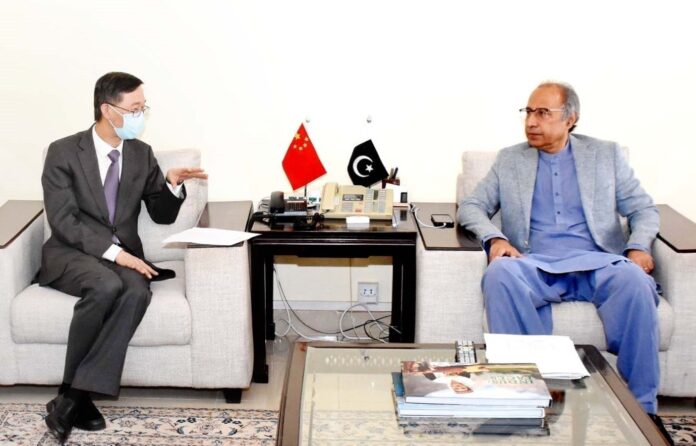ISLAMABAD: Adviser to Prime Minister on Finance and Revenue Dr Abdul Hafeez Shaikh has sought China’s support for Pakistan’s efforts to seek rollover of half of foreign $27.8 billion debt that is set to mature during the next three years.
During a meeting with Chinese Ambassador Yao Jing at the Finance Division, the adviser said that Pakistan looks forward to Chinese support in dealing with this unprecedented situation arising because of the coronavirus pandemic.
It is important to note that of the total $27.8 billion, around $19 billion have to be paid to only four major creditors of Pakistan – International Monetary Fund (IMF), World Bank (WB), Asian Development Bank (ABD) and China.
The adviser also discussed with the ambassador the effect of the coronavirus pandemic on the overall growth of the economy of the country as exports and remittances shall both suffer because the global economies are in recessionary phase.
He said that different economies have different levels of strength to deal with the economic losses and the developing countries will be the worst hit by the impact of this slowdown.
Keeping in view the present circumstances WB, IMF and G-20 countries are talking about debt relief without which developing countries will be worst affected. The adviser expressed hope that these forums would be able to come up with a plan enabling developing countries like Pakistan to not only meet its international obligations but also to provide relief to its population adversely affected by this pandemic.
The adviser thanked the Chinese government for all the assistance it has provided so far to Pakistan in dealing with the pandemic. He also shared with the ambassador the details of the economic relief package given by the government of Pakistan to the people whose lives and businesses have been affected by the pandemic.
He said that during this difficult time, the government has three major priorities: to provide health care and safety to its people, provide cash assistance to the most vulnerable and keep the wheel of the economy moving in slow but steady pace.
He also said the government came up with a comprehensive relief package of worth Rs1.2 trillion, which inter alia includes Rs200 billion assistance for workers and labourers, Rs100 billion for supporting SMEs and agriculture sector, Rs107 billion as sales tax refunds and Rs50 billion income tax refunds from 2014 onward.
He further said that the Ehsaas Programme, through its urgent cash disbursement, is taking care of the most vulnerable in the country and reduction in petrol and diesel prices and deferment of payment of bills are some other significant steps. Incentivising the construction sector is also an opportunity for those who are in need of work, he added.
It is worth mentioning here that from July 2020 to June 2023, Pakistan is required to make $27.8 billion worth of public debt-related payments to its international creditors on account of principal and interests. That includes $23 billion principal loans and another $4.6 billion on account of interest payments.
The amount of $27.8 billion is equal to 35 per cent of Pakistan’s external public debt, including that of the IMF. All of the repayment figures are based on Pakistan’s public external debt stock as of end December 2019.
Pakistan is scheduled to return $9.8 billion in fiscal year 2020-21, $8.8 billion in FY 2021-22 and $8.3 billion in FY 2022-23, according to the Ministry of Economic Affairs’ statistics.
The amount is exclusive of balance of payment support obtained from Saudi Arabia ($3 billion), United Arab Emirates (UAE) ($2 billion), China (safe deposit principal $3 billion) and Qatar $500 million.
Prime Minister Imran Khan has made an appeal to the world powers and multilateral institutions to write off loans of the developing nations. The Bretton Woods Institutions – WB and IMF – began their four-day virtual spring meetings on Tuesday. One of the agenda was to consider the possibility of debt relief for the developing countries.
























